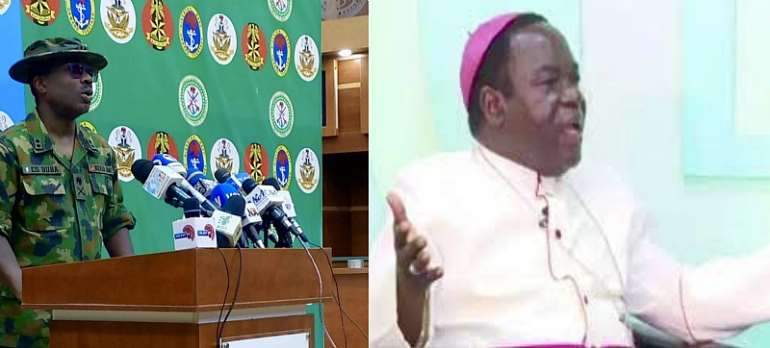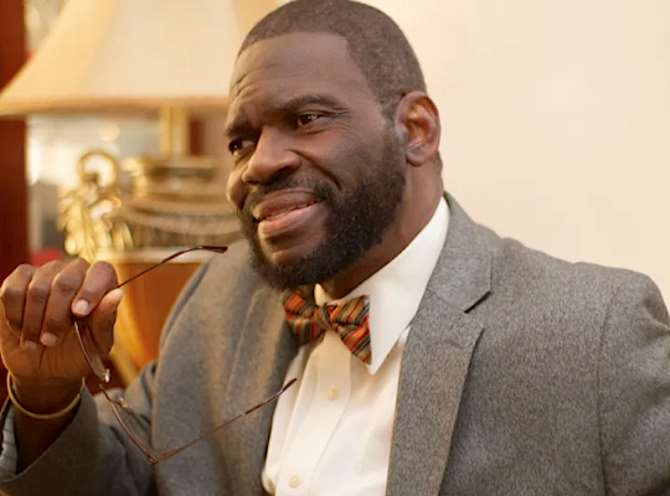Nigeria At The Crossroads: Revealing Layers Of Crisis - A Call For Transformation As We Enter 2024

the intricate tapestry of Nigeria's challenges, a thorough exploration unveils the interwoven complexities of corruption, militancy, and a leadership crisis. This narrative draws upon insights from a psychologist, Major General Edward Buba's military concerns, and the moral guidance of Bishop Matthew Kukah, transcending surface observations to delve into the essence of Nigeria's socio-psychological fabric and urging a holistic transformation.
This psychologist’s analysis attempts to uncover the inner undercurrents fueling societal unrest, where threatening and agitating groups like Boko Haram, Yoruba Nation, and IPOB are symptomatic of deeper systemic issues. While the call for leaders to comprehend these dynamics is imperative, it's crucial to emphasize that supporting these threatening groups is not advocated; rather, they are viewed as symptoms of a disturbed society.
Military representative Major General Edward Buba, in his role as Director of Defence Media Operation (DMO), acknowledges major threats but prompts a critical examination of root causes. The military's role extends beyond immediate challenges to understanding the broader landscape that breeds these issues, calling for a nuanced approach beyond military might to address societal factors contributing to unrest.
Bishop Matthew Kukah's moral guidance warns of eroding trust in the government's ability to secure its citizens. His call to reset Nigeria's security architecture transcends religious boundaries, resonating as a collective plea for action and emphasizing the need for a values-driven approach aligned with the nation's moral and spiritual fabric.
Officer Buba's voice adds a specific dimension, acknowledging major threats such as armed banditry and secessionist agitations. This underscores the urgency for leaders to not only understand but also address these challenges at their roots.
As Nigeria confronts these realities, the collective plea emerges: the nation stands at a critical juncture demanding more than surface-level solutions.
In a glaring paradox, the Ministry of Humanitarian Affairs, Disaster Management, and Social Development, a beacon of hope for the poor and vulnerable, stands accused of corruption. This ministry, entrusted with the welfare of the people, now finds itself entangled in allegations that underscore a stark contradiction in its mission. I mention this to bring attention to political, law enforcement, and military figures, as well as the broader Nigerian presidency, regarding underlying issues beneath some of the painful threats and insecurities. Such malevolent acts, known to many Nigerians and others, reveal disturbing issues within the Ministry of Humanitarian Affairs, Disaster Management, and Social Development, an institution meant to be a beacon of hope for the poor and vulnerable.
Let us delve a bit further to illustrate the disturbing acts within the nation's institutions. The recent arrest and revelations surrounding James Okwete, a contractor linked to the alleged diversion of N37bn COVID-19 School Feeding funds, expose a stark contradiction within the Ministry of Humanitarian Affairs, Disaster Management, and Social Development. Former CBN Governor Godwin Emefiele's alleged operation of 593 illegal accounts in the US, UK, and China, coupled with the illegal lodging of billions in foreign currencies without proper authorization, adds another layer to the crisis. The investigator's report indicates misuse of funds, illegal issuance of currency, and questionable legal fees, revealing a depth of financial misconduct.
This revelation not only stains Nigeria's reputation but also highlights broader governmental corruption issues, shaking the foundations of public trust in institutions. When a ministry meant to uplift the disadvantaged is tainted by corruption, it undermines belief in the government's commitment to citizens' well-being.
The nexus between armed banditry, secessionist agitations, and the broader leadership crisis is evident—a systemic malaise within the country's leadership structure. The Ministry, tasked with disaster relief and social development, faces corruption allegations, betraying its mandate. Simultaneously, alleged financial misconduct involving a former CBN Governor adds another layer to the crisis, revealing a systemic failure. This multifaceted challenge demands a comprehensive response. Addressing armed banditry and secessionist agitations requires tackling the root cause—the leadership crisis. The Ministry's alleged mismanagement of funds and Emefiele's questionable financial activities exemplify the erosion of ethical governance, contributing to socio-economic and political challenges.
To address Nigeria's challenges effectively, we must recognize their interconnected nature. Armed banditry and secessionist agitations are symptoms of a deeper crisis, demanding a holistic and sustained effort. Transformative measures, addressing systemic leadership failure, promoting ethical governance, and rebuilding public trust, are crucial for lasting stability.
A society embracing the rule of law, justice, and reduced ethnic and religious divides experiences fewer threats. Commitment to reducing leadership corruption fosters an environment conducive to peace. Pillars like the rule of law, justice, unity, and ethical leadership are fundamental to stability.
Fostering a stronger national identity by reducing ethnic and religious divides is crucial to diminishing the likelihood of agitating groups. The psychologist's analysis and the bishop's guidance converge, urging Nigerian leaders, including military and police, to transcend superficial responses. The call emphasizes understanding the intricate dynamics fostering discontent among the populace.
Unmasking the pervasive grip of corruption, the erosion of trust, and the betrayal of societal foundations, addressing leadership corruption becomes paramount. Corruption's insidious influence undermines the social contract, fracturing the relationship between government and citizens. Championing transparency, accountability, and ethical governance emerges as the antidote, paving the way for a sustainable peace.
These revelations crystallize into a resounding call for systemic transformation. The psychologist's insights into societal dynamics, Major General Buba's military concerns, Bishop Kukah's moral guidance, and the glaring corruption within critical ministries and financial institutions underscore the urgency for a comprehensive approach.
To navigate Nigeria's labyrinthine challenges, we must recognize these governmental malaises as symptoms of a deeper leadership crisis. Shallow solutions and narrow focus on immediate threats fall short. A holistic strategy, addressing the root causes, fortifying ethical governance, and rebuilding public trust, is indispensable for authentic transformation and stability.
In conclusion, unequivocally rejecting support for threatening groups, we acknowledge their symptomatic nature in a distressed society. Nigeria, shadowed by global recognition for corruption and compromised justice, stands at a crossroads. This critical juncture demands a paradigm shift, emphasizing holistic measures that address root causes, fostering unity, transparency, and accountability.
As Nigeria stands on the precipice of change, the imperative is clear—superficial fixes won't suffice. True transformation necessitates a comprehensive understanding of interconnected factors: socio-psychological intricacies, the pivotal role of the military and police, moral guidance, and the integrity of government institutions. Embracing this all-encompassing perspective, Nigeria can embark on a journey toward enduring stability, resilience, and a future that transcends current challenges.
Prof. John Egbeazien Oshodi
Professor John Egbeazien Oshodi, who was born in Uromi, Edo State, Nigeria, to a father who served in the Nigeria police for 37 years, is an American-based police and prison scientist and forensic, clinical, and legal psychologist. A government consultant on matters of forensic-clinical psychological services in the USA; and a former interim associate dean and assistant professor at Broward College, Florida. The Founder of the Dr. John Egbeazien Oshodi Foundation, Center for Psychological Health and Behavioral Change in African Settings. In 2011, he introduced state-of-the-art forensic psychology into Nigeria through N.U.C. and Nasarawa State University, where he served in the Department of Psychology as an Associate Professor. He has taught at various universities and colleges including Florida memorial University, Florida International University, Broward college, Lynn University, and a contributing faculty member at the Weldios university in Benin Republic, Nexus International University, Uganda, Nova Southeastern University and Walden University in USA. He is a Human Rights Psychologist with a focus on African related environments. [email protected]

